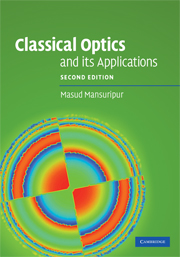Book contents
- Frontmatter
- Contents
- Preface to the second English edition
- Preface to the first edition
- Introduction
- 1 Abbe's sine condition
- 2 Fourier optics
- 3 Effect of polarization on diffraction in systems of high numerical aperture
- 4 Gaussian beam optics
- 5 Coherent and incoherent imaging
- 6 First-order temporal coherence in classical optics
- 7 The van Cittert–Zernike theorem
- 8 Partial polarization, Stokes parameters, and the Poincaré sphere
- 9 Second-order coherence and the Hanbury Brown–Twiss experiment
- 10 What in the world are surface plasmons?
- 11 Surface plasmon polaritons on metallic surfaces
- 12 The Faraday effect
- 13 The magneto-optical Kerr effect
- 14 The Sagnac interferometer
- 15 Fabry–Pérot etalons in polarized light
- 16 The Ewald–Oseen extinction theorem
- 17 Reciprocity in classical linear optics
- 18 Optical pulse compression
- 19 The uncertainty principle in classical optics
- 20 Omni-directional dielectric mirrors
- 21 Linear optical vortices
- 22 Geometric-optical rays, Poynting's vector, and the field momenta
- 23 Doppler shift, stellar aberration, and convection of light by moving media
- 24 Diffraction gratings
- 25 Diffractive optical elements
- 26 The Talbot effect
- 27 Some quirks of total internal reflection
- 28 Evanescent coupling
- 29 Internal and external conical refraction
- 30 Transmission of light through small elliptical apertures
- 31 The method of Fox and Li
- 32 The beam propagation method
- 33 Launching light into a fiber
- 34 The optics of semiconductor diode lasers
- 35 Michelson's stellar interferometer
- 36 Bracewell's interferometric telescope
- 37 Scanning optical microscopy
- 38 Zernike's method of phase contrast
- 39 Polarization microscopy
- 40 Nomarski's differential interference contrast microscope
- 41 The van Leeuwenhoek microscope
- 42 Projection photolithography
- 43 Interaction of light with subwavelength structures
- 44 The Ronchi test
- 45 The Shack–Hartmann wavefront sensor
- 46 Ellipsometry
- 47 Holography and holographic interferometry
- 48 Self-focusing in nonlinear optical media
- 49 Spatial optical solitons
- 50 Laser heating of multilayer stacks
- Index
- References
20 - Omni-directional dielectric mirrors
Published online by Cambridge University Press: 31 January 2011
- Frontmatter
- Contents
- Preface to the second English edition
- Preface to the first edition
- Introduction
- 1 Abbe's sine condition
- 2 Fourier optics
- 3 Effect of polarization on diffraction in systems of high numerical aperture
- 4 Gaussian beam optics
- 5 Coherent and incoherent imaging
- 6 First-order temporal coherence in classical optics
- 7 The van Cittert–Zernike theorem
- 8 Partial polarization, Stokes parameters, and the Poincaré sphere
- 9 Second-order coherence and the Hanbury Brown–Twiss experiment
- 10 What in the world are surface plasmons?
- 11 Surface plasmon polaritons on metallic surfaces
- 12 The Faraday effect
- 13 The magneto-optical Kerr effect
- 14 The Sagnac interferometer
- 15 Fabry–Pérot etalons in polarized light
- 16 The Ewald–Oseen extinction theorem
- 17 Reciprocity in classical linear optics
- 18 Optical pulse compression
- 19 The uncertainty principle in classical optics
- 20 Omni-directional dielectric mirrors
- 21 Linear optical vortices
- 22 Geometric-optical rays, Poynting's vector, and the field momenta
- 23 Doppler shift, stellar aberration, and convection of light by moving media
- 24 Diffraction gratings
- 25 Diffractive optical elements
- 26 The Talbot effect
- 27 Some quirks of total internal reflection
- 28 Evanescent coupling
- 29 Internal and external conical refraction
- 30 Transmission of light through small elliptical apertures
- 31 The method of Fox and Li
- 32 The beam propagation method
- 33 Launching light into a fiber
- 34 The optics of semiconductor diode lasers
- 35 Michelson's stellar interferometer
- 36 Bracewell's interferometric telescope
- 37 Scanning optical microscopy
- 38 Zernike's method of phase contrast
- 39 Polarization microscopy
- 40 Nomarski's differential interference contrast microscope
- 41 The van Leeuwenhoek microscope
- 42 Projection photolithography
- 43 Interaction of light with subwavelength structures
- 44 The Ronchi test
- 45 The Shack–Hartmann wavefront sensor
- 46 Ellipsometry
- 47 Holography and holographic interferometry
- 48 Self-focusing in nonlinear optical media
- 49 Spatial optical solitons
- 50 Laser heating of multilayer stacks
- Index
- References
Summary
An omni-directional dielectric mirror (also known as a one-dimensional photonic bandgap crystal) exhibits 100% reflectivity at all angles of incidence and for all states of incident polarization. Unlike metallic mirrors, which absorb a small fraction of the incident optical power, dielectric reflectors are lossless. These properties make omni-directional dielectric mirrors ideal candidates for applications in which a beam of light in an unknown or unpredictable polarization state is likely to arrive at the mirror from any direction, and in which loss of light at the mirror, no matter how small, is deemed intolerable. A good example is provided by the walls of an optical waveguide. Since there are numerous reflections from the wall as a beam of light travels through, even small losses at each encounter with a wall rapidly deplete the beam's energy.
A typical omni-directional reflector is a periodic stack of bilayers, each bilayer consisting of a high-index and a low-index dielectric layer. The larger the refractive indices of the available dielectrics (and also the larger the difference between these indices), the easier it is to design the reflector. For example, if the two materials available for fabricating a stack of bilayers have indices n1 = 1.5 and n2 = 2.0, it is impossible to obtain omni-directionality for both p- and s-polarized light. However, with n1 = 1.5 and n2 ≥ 2.3, an omni-directional reflector can be designed.
- Type
- Chapter
- Information
- Classical Optics and its Applications , pp. 274 - 288Publisher: Cambridge University PressPrint publication year: 2009



